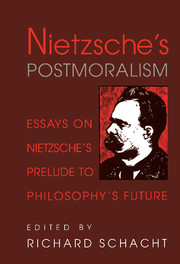Book contents
- Frontmatter
- Contents
- Contributors
- Preface
- A Note on References
- Introduction
- Nietzsche on the Illusions of Everyday Experience
- Masters without Substance
- Rethinking the Subject: Or, How One Becomes-Other Than What One Is
- The Youngest Virtue
- Morality as Psychology, Psychology as Morality: Nietzsche, Eros, and Clumsy Lovers
- On the Rejection of Morality: Bernard Williams's Debt to Nietzsche
- Nietzsche's Virtues: A Personal Inquiry
- Nietzschean Normativity
- Nietzsche's Perfectionism: A Reading of Schopenhauer as Educator
- Bibliography
The Youngest Virtue
Published online by Cambridge University Press: 20 May 2010
- Frontmatter
- Contents
- Contributors
- Preface
- A Note on References
- Introduction
- Nietzsche on the Illusions of Everyday Experience
- Masters without Substance
- Rethinking the Subject: Or, How One Becomes-Other Than What One Is
- The Youngest Virtue
- Morality as Psychology, Psychology as Morality: Nietzsche, Eros, and Clumsy Lovers
- On the Rejection of Morality: Bernard Williams's Debt to Nietzsche
- Nietzsche's Virtues: A Personal Inquiry
- Nietzschean Normativity
- Nietzsche's Perfectionism: A Reading of Schopenhauer as Educator
- Bibliography
Summary
Redlichkeit, Nietzsche tells us, is the youngest virtue (Z I:3). Not recognized by either Socrates or Christianity, it is still developing in 1881 (D 456), although it has by then already become one of Nietzsche's four cardinal virtues, requiring that we be “redlich with ourselves and with whatever else is friend to us” (D 556). By the following year, when he raises a toast to the gay science of physics, Nietzsche emphasizes the dependence of that science on the Redlichkeit that makes joyous physicists of those of us who “want to become who we are” (GS 335). Finally, after another three years have passed, Redlichkeit has become the only virtue that is left to those of us who are “free spirits” (BGE 227).
These references lead me to the confident conclusion that Redlichkeit is something whose value Nietzsche thinks at least some of us should recognize; but they also lead me to a question: What does this Redlichkeit involve? In response, most (and perhaps all) English translations of Nietzsche suggest an apparently simple answer: To be redlich is to be honest. But this serves only to complicate the question: Is being honest indeed the same as being redlich? And even if it is, what is involved in being honest?
Beyond Honesty
Is Redlichkeit honesty? So it is generally translated, but so too is “Ehrlichkeit,” so, at times, is “Rechtschaffenheit,” and so could be, not unreasonably, “Anständigkeit” and “Probität.”
- Type
- Chapter
- Information
- Nietzsche's PostmoralismEssays on Nietzsche's Prelude to Philosophy's Future, pp. 63 - 78Publisher: Cambridge University PressPrint publication year: 2000
- 3
- Cited by

